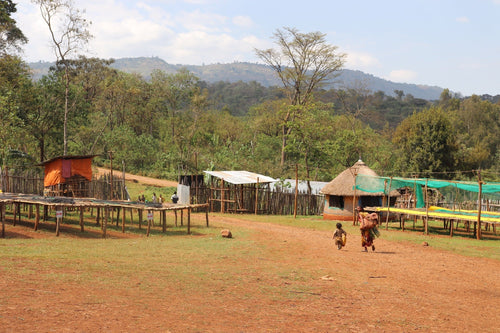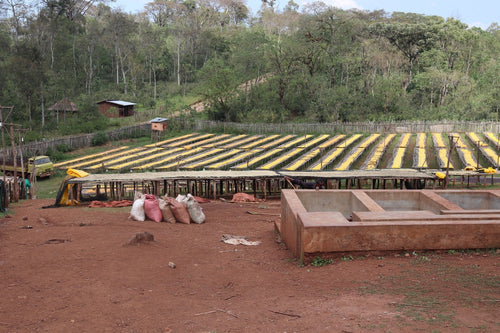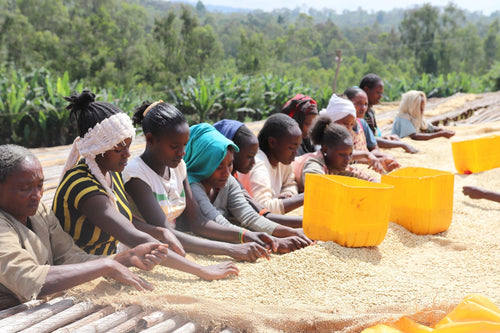This is a special one for us! We've sourced dozens of Yirgacheffes and Sidamos in our short tenure at Skylark, but this is our first relationship in Djimmah and this is our second year buying this coffee!
Djimmah coffees are often overlooked or looked down on in favor of the cleaner and more stereotypical profiles of the Yirgacheffes, but they harvest earlier in the season and can produce some real gems like this one that tastes like Summer Blackberry, Caramel and Chamomile.
Sourcing African coffees ethically is a veritable minefield. It's so hard to know if every person in the supply chain is being well paid and well treated... and that's coming from someone who used to live and source coffee in Ethiopia. Even harder is finding a coffee that's got traceable credentials. We are proud of this coffee, and proud of the work going on by Falcon and Techno Serve in Ethiopia to make sure that farmers can increase their production year on year-- so proud that we contributed to it by supporting 10 farmers ourselves.
You can read more about the origin and buying practices below:
Mustefa Abakeno is a smallholder with 18 hectares of land near Agaro in the Jimma Zone of Western Ethiopia. His farm is located at 2,040masl and is planted with coffee varieties from the Jimma research centre. Mustefa has a small disc pulper that he uses to wash-process half of his coffee; the other half is dried as a natural. Due to a lack of water in the area and limited space to ferment the coffee, Mustefa ferments the pulped coffee for a short period (8 hours) before he moves it to his drying beds (for 13-16 days), and the result is something like a light honey. The naturals take 24-27 days to dry on the African (raised) beds. Mustefa only registered as an exporter in 2018 in order to sell his coffee directly to buyers, which he was able to do after changes to the regulations that year. The small wet mill he set up (called Beshasha) is used to process his own and outgrowers’ coffee, which he keeps separate and dries on raised beds near his house. Mustefa’s outgrowers are all neighbours and each have between 4 and 10 hectares of land.
With the support of the Falcon team in Addis Ababa, we are able to work directly with small producers such as Mustefa. We see a huge opportunity to improve quality through direct relationships, as we are able to work with the producers on cherry selection, drying and farm management. We are also able to make the supply chain more efficient and so maximise the money going back to the producers.
In 2021, Falcon Addis added an agronomist to their team, Harun. Harun’s primary focus during this last harvest has been to train and support Mustefa and the local farmers that bring their cherries to the washing station. Harun has been improving processes at the washing station: installing shade netting to cover drying beds during the `hottest hours of the day; instigating cherry selection at the delivery point; tagging day lots in order to keep them separate and monitor moisture content throughout the drying phase, ensuring even drying before the lots are assembled.
Mustefa has a small field lab and in 2020 he bought a high-spec Sinar moisture reader to ensure that all the parchment dried in the stations was reaching the same moisture level before being stored in the warehouse. Harun has been assessing and grading the dried day-lots, putting them together based on quality and cupping profile. He is currently training farmers in good agricultural practices (GAP) in order to improve the quality and productivity of their coffee gardens.
In 2020, Mustefa acquired a second washing station, Kabira, to receive cherries from local producers. Due to subtle differences in location and microclimate, Beshasha now almost exclusively processes washed lots, while Kabira, which has more space for drying beds, is more suited to processing naturals. This is why we have renamed the lots after the washing stations where they were processed.
Elevation: 2040 Meters above sea level
Varietal: landrace
Cup score: 85
Price paid per kg: £7.92
Process: Natural


